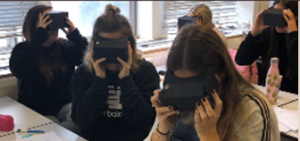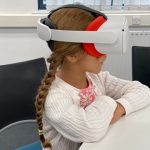(BU Nursing Students using VR Headsets)
The Team
Dr Heidi Singleton, Professor Steven Ersser and Professor Debbie Holley, Dr Xiaosong Yang, Dr Emily Arden-Close, Amanda Roberts (Nottingham Support Group for Carers of Children with Eczema), Professor Liz Falconer (Virtual Heritage) and Yaqing Cui (research assistant).
Background to the project
Atopic eczema, (atopic dermatitis (AD) is a long-term inflammatory skin condition and one of the commonest childhood illnesses. It is a debilitating disease with high levels of disease burden for the patient (Blakeway 2020). The main symptoms are itch and dryness. AD is the most common long-term disorder, affecting up to 20% of children in industrialised countries (Tsakok 2019).
Standard treatment is trigger/irritant avoidance and regular application of emollients and topical steroids/calcineurin inhibitors (Wollenberg 2020). There have been concerns around steroid withdrawal amongst some patients who have very severe AD. Hence, non-pharmacological treatments are being sort.
In addition to educational programmes, a range of psychological therapies are used to treat children. These include mindfulness, relaxation, and guided imagery techniques to distract children from the scratch itch cycle that contributes to insomnia and impacts on quality of life (LeBovidge 2021). The last Cochrane review of Psychological and Educational interventions revealed no robust interventions to enhance effective guided imagery in this context (Ersser et al 2014). Furthermore, virtual reality (VR) has not been sufficiently applied to intervention development in dermatology.
Traditionally, guided imagery has been used in the form of audio scripts spoken to the patient to guide their imagination away from any stress and the itching sensation (Vagnoli 2019). The use of VR works to focus attention, distracting the patients in relation to different environmental stimuli (Carrougher 2009). Whilst we have found no previous studies that have evaluated VR to treat eczema, it has been used to treat anxiety, burns and pain (Barros 2014; Scapin 2018). Since itch and pain can be triggered from the same receptive fields in the skin (Behrang 2020), it is proposed that VR could be used as a more sophisticated and immersive version of guided imagery. VR displaces a person to an imagined ‘other’ location, with complete immersion as the goal (Brigham 2017), physically blocking out the real world and replacing it with a computer-generated world which includes visual, auditory, and haptic stimuli. VR may potentiate the distractive effect, building on what would be the more limited reach of existing guided imagery interventions. Therefore, our hypothesis is that VR would provide immersive diversion from unpleasant symptoms of eczema. Singleton is leading a Cochrane review protocol of the evidence base, due for publication in August 2021.
Project Aim
To co-create immersive VR based on the guided imagery approach to treating eczema (Ersser 2014); targeted at children (aged between 7 and 11 years of age).
Bournemouth University would like to know what kind of VR game will help children with eczema relax and stop scratching.
Can I take part in the project?
If you are aged between 7 and 11 years old, and you have eczema, ask your grown up if you can take part in our research project.
What do I need to do?
If you want to take part, then you will need to complete an online questionnaire (your adult can help you read/type). Every child who completes a questionnaire will be entered into our prize draw with the chance to win a £50 Amazon voucher or one of five £10 Amazon vouchers (selected randomly by our computer). Each child can complete the questionnaire once (so if you have more than one eligible child then you can do more than one entry per household).
When you fill in the questionnaire it will give you the chance to volunteer to take part in an optional zoom session with Dr Heidi Singleton/ Professor Debbie Holley. The zoom session will allow you to view the virtual reality game/scene and then you can let us know what you think about it. We will send you a google cardboard headset in the post (which you can keep), you will be able to view the software via this headset. Every child who takes part in the zoom session will be sent a £20 Amazon voucher (to their adult’s email address).
Where can I find the online survey?
The questionnaire is now live, and we would love your replies by Wednesday 30th June.
Link Here: https://bournemouth.onlinesurveys.ac.uk/chilloutvr

 HEIF Small Fund Research Project: Virtual Reality Chillout
HEIF Small Fund Research Project: Virtual Reality Chillout










 Second NIHR MIHERC meeting in Bournemouth this week
Second NIHR MIHERC meeting in Bournemouth this week Dr. Ashraf cited on ‘Modest Fashion’ in The Guardian
Dr. Ashraf cited on ‘Modest Fashion’ in The Guardian NIHR-funded research launches website
NIHR-funded research launches website MSCA Postdoctoral Fellowships 2025 Call
MSCA Postdoctoral Fellowships 2025 Call ERC Advanced Grant 2025 Webinar
ERC Advanced Grant 2025 Webinar Horizon Europe Work Programme 2025 Published
Horizon Europe Work Programme 2025 Published Horizon Europe 2025 Work Programme pre-Published
Horizon Europe 2025 Work Programme pre-Published Update on UKRO services
Update on UKRO services European research project exploring use of ‘virtual twins’ to better manage metabolic associated fatty liver disease
European research project exploring use of ‘virtual twins’ to better manage metabolic associated fatty liver disease
Please do spread the word about this online survey. We need more participants please (children with eczema aged 7-11 years).